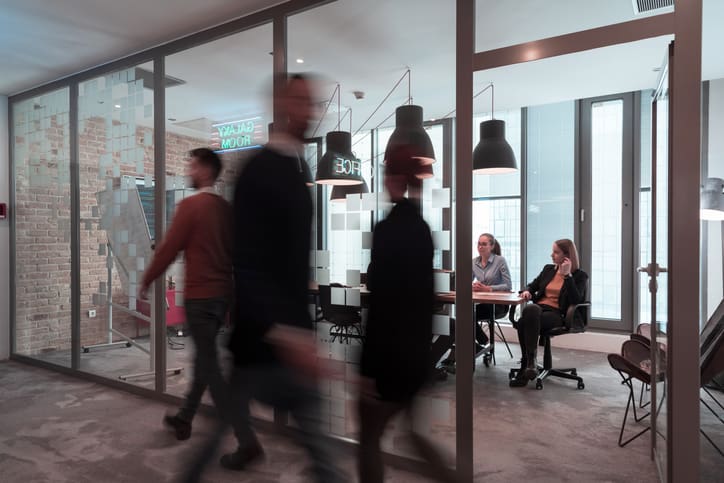If I had to choose a catchphrase for the world of work today, it would be a mashup of Back To The Future and The Fast And The Furious. It’s not hard to see that the changes of tomorrow are coming fast (in many cases, they’re already here), disrupting everything we thought we knew. For both employers and employees, the pandemic was the catalytic moment that transformed where and how we work, but the trends were there beforehand. I was recently interviewed on this topic by Authority magazine for its interview series, “Preparing For The Future Of Work,” and I shared my observations and predictions about the trends I’m seeing out in the field. I discuss many of them below, and you can read the entire interview here.
Think about current and future business disruptions like an anthropologist.
As I say in the Authority magazine article, employers need to start looking ahead now and figuring out how they are going to adapt to major change. I’m a corporate anthropologist, and my question for business leaders is always: What do you see all around you that you may not be paying attention to? Look at your business from the outside in, and make a point of engaging your employees in the discovery process. Talk to your customers and ask them what is disrupting them. Spend a day in the life of your customer of tomorrow. Most importantly, think about how disruptions are opportunities for your business to create new markets, stop competing against others, and build real value, innovatively.
Some of the cultural, societal and global disruptions that are transforming businesses today and into the future:
- Will energy costs return to stability? Declining demand for petroleum and the rise of electric vehicles are changing the oil and gas industry, probably forever.
- Will there be peace in the world? The war in Ukraine is not only threatening people of all nations but also transforming the basic foundations on which they have built their businesses.
- Will the Great Resignation continue? This movement significantly disrupted workforces everywhere. Will it continue, or even accelerate?
- Is your data safe and secure? Cybersecurity has grown into a significant concern, and the risks associated with phishing, hacking and data disruptions are real and profound.
- Leadership styles are changing. Employees are developing the innovative skills they need to thrive in fast-moving times, and new business environments and expectations are forcing employers to change their methods.
- Profound demographic changes continue to disrupt our notion of what the workplace should be. Business leaders must determine how to retain their older workforce while developing a very different younger worker with different aspirations, skills and values.
- Diversity, equity and inclusion must shift from words into actions. We must build businesses that recognize the value of a highly diversified workforce, and that boldly provide pay equity, gender equality and inclusion.
- Capitalize on the opportunities that new technologies offer. Employers, find omnichannel ways to develop your workforce and engage with them to sustain their involvement with your company. Employees, leverage and develop the skills you need to master the new technology.
- Where and when we work is changing. As you look to the future, you need to go of the way you used to work in the past. It is a moment to rethink the very nature of work, the workday, what you want from employees and how to evaluate their performance.
- Consumer behavior is changing, again! A changing consumer will continue to disrupt who you sell to and what their expectations are for what you’re trying to sell them.
- Climate change is now, not in the future. How will these changes impact your organization? How you thought about it? It can’t wait.
- Supply chain disruptions will be with us for a very long time. The pandemic showed the world how fragile its supply chains are. It is time to rethink the whole system, using technology to transform it and build new solutions to reduce the risks associated with an increasingly vulnerable global system.
Today’s jobseekers don’t just want to find employment, but employment that fits their talents and interests.
Unlike past generations, people today are looking for jobs that provide autonomy, mastery and purpose. They also want to belong to an organization that they can relate to, where they feel that they matter and can contribute something meaningful. The key is to find the type of job that is right for you, not someone else.
Should the future workforce try to plan their careers so they are not replaced by automation or robots?
Not necessarily. As I state in the Authority magazine article, every time we have had a significant technological transformation, there has been a demand for increased labor within that industry, even if the skills that were required had to change. Remember, technology changes not just the job but the society using it. Don’t be afraid of the unfamiliar or the unknown. There will be lots of jobs, not just the ones you might have expected before.
The entire concept of where and how we work is ready for some rethinking.
The 40-hour workweek was created over 100 years ago. Since then, technology has transformed what we do and how and where we do it, including our definition of what is home and what is work, the essential roles of freelancers and contract labor, the ascending power of women and people of color in the workplace, and the necessity of childcare and paid family leave.
5 trends to watch in the future of work:
1. ENERGY AND ENERGY PRICES ARE NOT STABLE, NOR WILL THEY EVER BE
The pandemic created one economic shock to energy prices, and the war in Ukraine has created another. These disruptive changes will continue as the world responds to a continuing shift in global interdependence and conflicts.
2. DEMOGRAPHY IS DESTINY
Demographic trends are catalysts for change. The global population is aging and younger generations are setting the stage for the next era of technological and cultural developments. Amidst this constant change, a common trap is to ignore the enormous power of demography and not see how it impacts us to the degree that it does.
3. GENDER AND RACIAL DIVERSITY, EQUITY AND INCLUSION
For employers in businesses of all sizes, the time is now to break down barriers for women and people of all different backgrounds and sexuality in your workforce and among your customers. When you create positive, purposeful cultures where diversity can thrive, your company will actually do better.
4. TECHNOLOGY WILL DRIVE THE CULTURAL TRANSFORMATION THAT IS COMING
Whether it is blockchain, 5G, AI, machine learning, electric vehicles, autonomous vehicles or whatever is your favorite technological innovation, the world is transforming before our very eyes. Employers, you need to see these new technologies as enormous opportunities for you.
5. THE WORLD IS NO LONGER FLAT
Whether you need to recreate your supply chain or rethink your reliance on cheap labor, you need to act, and fast, to the massive sea changes that are happening. The need for a new world order will be a fast-moving trend to pay close attention to.
I am more optimistic than ever about the future of work and workers.
I marvel at how women are changing their corporate cultures for a better life for themselves and their employees, or leaving the workforce altogether to start their own businesses. I work with many prominent entrepreneurs and small business owners, including women and diverse people of color from different backgrounds. They don’t just talk about diversity, equity and inclusion. They purposefully create cultures where people from different walks of life can build better together. And it’s working. The opportunities are exciting!
From Observation to Innovation,

Andi Simon, Ph.D.
CEO | Corporate Anthropologist | Author
Andisimon.com
Info@simonassociates.net
@simonandi
LinkedIn



